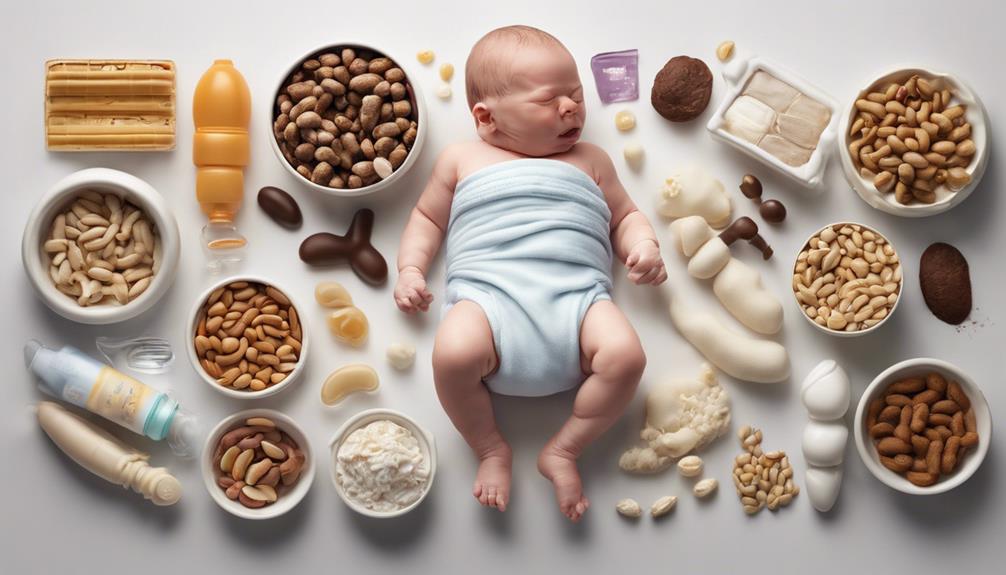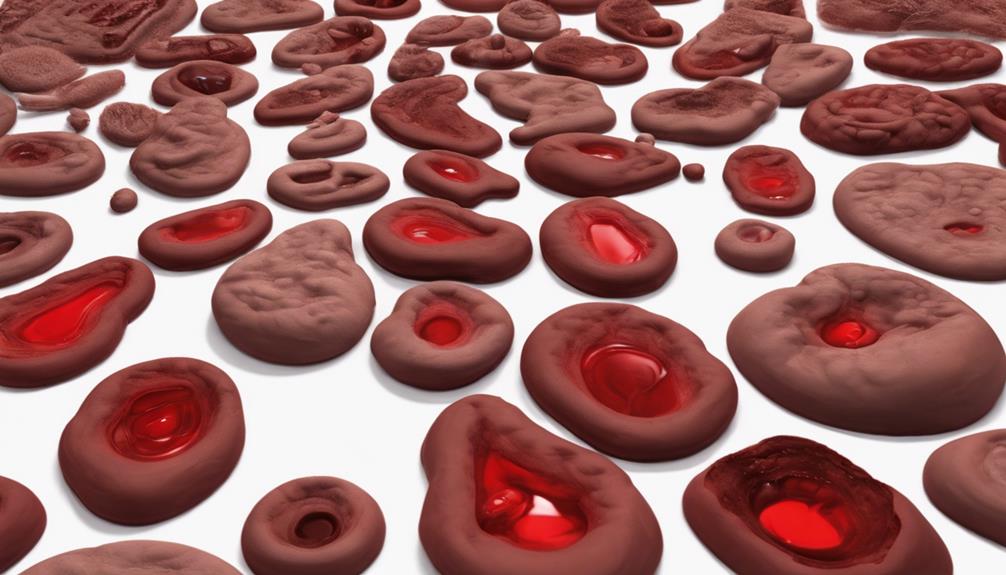As we navigate the murky waters of understanding why newborns might show signs of blood in their poop, it is crucial to shed light on five common reasons that can leave parents feeling puzzled and concerned.
From constipation to potential food allergies, the journey through these causes reveals a spectrum of possibilities. However, one particular reason stands out as a silent culprit, often overlooked yet significant in its implications.
Understanding this factor could hold the key to unraveling the mystery behind newborns' unexpected symptoms.
Key Takeaways
- Constipation can cause blood in newborns' stool from rectal tears due to hard stools.
- Food allergies like Cow's Milk Protein Allergy can lead to bloody stools in newborns.
- Gastrointestinal bleeding, including NEC, infections, and other conditions, can also cause blood in stool.
- Maternal nipple injuries during breastfeeding can introduce maternal blood into breast milk, affecting the baby's stool color.
Constipation as a Cause
Constipation can frequently result in newborns passing stool with blood due to small tears in the rectum caused by the strain of hard, dry stools. When babies experience constipation, their bowel movements become infrequent, stools harden, and they may show signs of abdominal discomfort. This condition can stem from various factors such as diet changes, dehydration, or even formula intolerance. Identifying constipation in newborns is important, as it can lead to these uncomfortable symptoms and the presence of blood in their poop.
To address constipation in newborns, dietary adjustments play an important role. Increasing fiber intake through breast milk or specialized formula can help soften stools, making bowel movements easier for the baby. Ensuring adequate hydration is also essential to prevent constipation. Sometimes, gentle tummy massages can help alleviate discomfort and promote bowel movements. By understanding the symptoms and causes of constipation in newborns, caregivers can take proactive steps to provide relief and support their little ones' digestive health.
Food Allergies and Sensitivities

Food allergies and sensitivities can trigger various digestive issues in newborns, potentially leading to bloody stools as a significant symptom. Cow's Milk Protein Allergy (CMPA) is a prevalent cause, responsible for over half of the cases. The symptoms of food allergies causing bloody stools may manifest as diarrhea, abdominal pain, and changes in stool consistency. To diagnose food allergies as the root of bloody stools, healthcare providers rely on a thorough medical history, physical examination, stool sample analysis, and sometimes allergy testing.
Managing food allergies in newborns with bloody stools involves removing the allergen from their diet, whether breast milk or formula, always under medical supervision. Preventing food-induced bloody stools in newborns requires early recognition of symptoms, immediate medical assessment, and appropriate dietary modifications to prevent allergen exposure. By taking these steps, caregivers can help alleviate the symptoms and improve the well-being of newborns experiencing food allergies.
Gastrointestinal Tract Bleeding
Gastrointestinal tract bleeding in newborns can stem from various conditions, such as Necrotizing Enterocolitis (NEC), a severe inflammatory bowel disease that poses significant risks, particularly for premature infants. Here are some key points to keep in mind:
- NEC is a common cause of gastrointestinal bleeding in premature infants, with a mortality rate of 20-30% in very low birth weight babies.
- Other potential causes of gastrointestinal bleeding in newborns include infections, food allergies, constipation, and intussusception.
- Symptoms that may indicate gastrointestinal bleeding in newborns include visible blood in stool, changes in stool consistency, fever, diarrhea, and abdominal pain.
It is essential to seek prompt medical attention if you notice any signs of gastrointestinal bleeding in your newborn. Early diagnosis and appropriate treatment are vital to prevent complications and guarantee the well-being of your baby. Remember, your healthcare provider is there to help and guide you through any concerns regarding your newborn's health.
Infections Leading to Blood

Infections can lead to visible blood in a newborn's stool due to the inflammatory response and damage they cause in the gastrointestinal tract. Bacterial gastroenteritis is a common culprit, often resulting in bloody stools in newborns. Additionally, viral infections such as rotavirus and parasitic infections like giardiasis can also lead to blood in a newborn's poop. These infections trigger inflammation and damage within the gastrointestinal tract, manifesting as bloody stools.
Prompt diagnosis and treatment are important in managing these infections to prevent complications associated with bloody stools in newborns. Proper identification of the infectious agent through diagnostic tests is essential for effective treatment strategies. Treatment may involve antibiotics for bacterial gastroenteritis, supportive care for viral infections, or specific anti-parasitic medications for parasitic infections. Complications such as dehydration and electrolyte imbalances can arise if these infections aren't promptly addressed.
Early intervention and appropriate management play an important role in ensuring the well-being of newborns with bloody stools.
Parental Nipple Injuries
Parental nipple injuries may contribute to the presence of blood in a newborn's stool, potentially resulting from maternal blood entering the baby's digestive system through cracked or injured nipples during breastfeeding.
When discussing parental nipple injuries and their impact on newborns, it's important to understand the following key points:
- Maternal Blood Transmission: Cracked or injured nipples during breastfeeding can introduce maternal blood into breast milk, which the newborn may ingest, leading to the appearance of blood in the stool.
- Temporary Discoloration: Swallowed maternal blood can cause a temporary discoloration of the baby's stool, often alarming parents. However, this discoloration is generally benign and resolves on its own.
- Importance of Prompt Treatment: It's essential for breastfeeding parents to address and treat nipple injuries promptly. By taking care of these injuries, parents can prevent the transmission of blood to the baby's digestive system, ensuring the baby's stool returns to normal once the nipple injury heals.
Frequently Asked Questions
Can Overfeeding Cause Blood in Stool?
Yes, overfeeding can cause blood in stool in newborns. When we overfeed infants, their delicate digestive systems become stressed, leading to irritation, inflammation, and potential tears in the intestinal lining, resulting in bloody stools.
Can Breastmilk Cause Blood in Stool?
Yes, breastmilk can cause blood in a newborn's stool if the mother has cracked nipples, leading to the baby ingesting small amounts of blood during feeding. It's important for nursing mothers to promptly address nipple injuries to avoid this issue.
Why Is My Baby Pooping Blood Mucus?
We observed blood and mucus in our baby's poop, signaling potential intestinal issues like infections or allergies. Consulting our pediatrician was essential for a prompt diagnosis and appropriate treatment plan to address our baby's health concerns effectively.
Is Blood in Newborn Diaper Normal?
Yes, blood in a newborn's diaper can be important. It is essential to pay attention to any blood amount and accompanying symptoms. Factors like feeding choice and gestational age can affect blood in stool. Seeking medical attention for persistent blood is essential.
Conclusion
To summarize, it's imperative for caregivers to remain vigilant and informed about the potential causes of blood in newborn poop.
By understanding the common reasons such as constipation, food allergies, gastrointestinal bleeding, infections, and parental nipple injuries, early detection and intervention can be prioritized.
Remember, knowledge is power when it comes to ensuring the health and well-being of our little ones.









